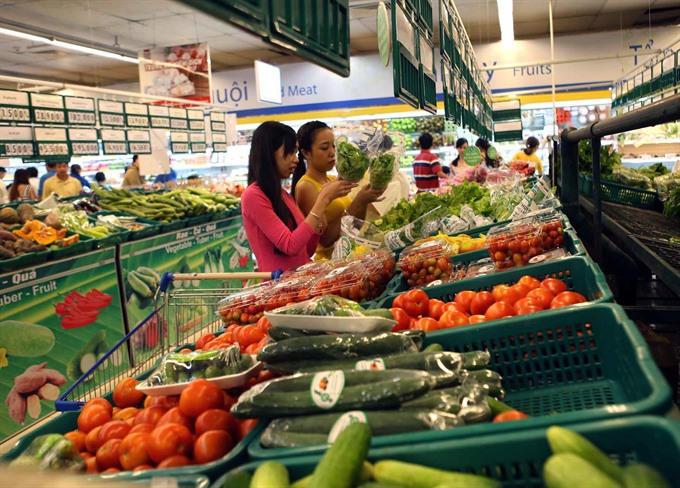 Economy
Economy

The Government and its agencies will have to make their best efforts to ensure inflation growth stays below 5 per cent at the end of this year, Deputy Prime Minister Vương Đình Huệ said at a meeting yesterday.
 |
Customers shop at CoopMart Vĩnh Long supermarket in the southern Vĩnh Long Province’s Vĩnh Long town. Việt Nam’s consumer price index (CPI) in the first three quarters rose nearly 2.1 per cent year on year. — VNA/VNS Photo Vũ Sinh |
HÀ NỘI — The Government and its agencies will have to make their best efforts to ensure inflation growth stays below 5 per cent at the end of this year, Deputy Prime Minister Vương Đình Huệ said at a meeting yesterday.
According to the Ministry of Finance, Việt Nam’s consumer price index (CPI) in September increased by 3.14 per cent from December 2015 and 3.34 per cent from September 2015, making the first nine months’ average CPI rise 2.07 per cent year on year.
The main reasons for the rise of CPI in the first nine months are the increase of fees in the education and healthcare sectors, which in turn helped the CPI in those sectors jump 4.83 per cent and 8.12 per cent year on year, respectively, contributing 0.28 per cent each to the country’s CPI growth.
The CPI growth was also attributed to rising food prices, which were pulled up by rising demand for food on the world’s volatile commodities markets, bad weather conditions, the raise of the regional minimum wage on January 1 and the raise of basic salary on May 1.
October’s CPI is forecast to increase due to hikes in health services fees and gas and oil prices caused by looming hikes in the world’s gasoline and oil prices, leaving room for CPI growth at approximately 1 per cent during the last two months.
“We are determined and capable of keeping this year’s inflation growth below 5 per cent, which is the target set by the National Assembly, by taking careful steps from now until the end of this year,” Deputy Prime Minister Huệ said.
The pressure to accomplish that target would remain heavy as continuing bad weather conditions and rising demand of food products may push food prices higher, and a November OPEC’s production cut could make oil and gas prices rebound, Huệ said.
To achieve the target of less than 5 per cent inflation growth, Huệ urged ministries and their agencies to work closely together and keep the focus on controlling prices at reasonable levels.
The State Bank of Việt Nam (SBV) must maintain the core inflation rate for this year between 1.81 per cent and 2 per cent, and keep close watch on economic and financial developments on both domestic and international markets, according to the Deputy PM.
The SBV also has to keep strict control of lending policies, help local banks to cut costs and assist preferential industries, including agriculture, startup businesses and small- and medium-size enterprises, to get access to the capital.
The Ministry of Industry and Trade (MoIT) must manage and keep goods prices stable during the last three months, especially retail electricity and dairy products for children below six months old.
The MoIT should also keep track of global oil prices and use the fuel stabilisation fund in an efficient way to avoid putting more pressure on local production.
The MoIT and the Ministry of Agriculture and Rural Development need to prepare and make sure local market could meet the demand of necessary goods during the year-end holidays, and forecast and deal with the negative effects caused by bad weather conditions.
The Ministry of Health, the Ministry of Finance and Việt Nam Social Insurance must organise bidding competitions to pull pharmaceutical prices down, and keep service fees unchanged for clients who do not have health insurance.
The increase in healthcare service fees must be reconsidered as it would strongly affect the country’s inflation rate if they come into effect, Huệ said, adding that the fee increases could be implemented next year. — VNS




